Concert
Junge Deutsche Philharmonie / Ensemble Modern

John Cage © Christopher Felver
In 1976, on the bicentenary of the USA, John Cage composed Apartment House 1776 as a commission for the combined forces of the Boston Symphony Orchestra and its chief conductor Seiji Ozawa, the Los Angeles Philharmonic, the New York Philharmonic and the Philadelphia Orchestra. In Apartment House 1776, Cage collected music from the time of the American War of Independence, and Protestant, Sephardic, Indian and Afro-American songs of diverse ethnic origins within the USA.
“The title refers to the fact that many things happen at the same time.” For each performance, the performers are required create a new, unique version. At the premiere in Boston, where American resistance to British colonial power originally took seed, Apartment House 1776 was performed alongside Renga. “Renga” is the term for Japanese chain poetry with a fixed number of syllables. For his musical work of the same name, Cage spatially arranged 360 drawings by the American transcendentalist Henry David Thoreau, according to rules of Japanese poetry, and then converted them into parts for 87 instruments with the aid of chance operations from the I Ching. Like Charles Ives, who paid tribute to Thoreau in his piano sonata “Concord, Mass., 1840-60”, John Cage was also fascinated by the progressive reform ideas of the 19th century American transcendentalists.
In several of his compositions, Cage drew on star charts by the Czech astronomer Antonín Bečvář, transferring the constellations from the charts in Bečvářs Atlas eclipticalis into musical notation systems, with the differing intensities of the stars determining the dynamics of individual tones.
Ensemble Modern, for over 30 years one of the major forces of contemporary music, has a tradition of passing on their experiences to young musicians. Together with the Junge Deutsche Philharmonie, under contemporary-music specialist conductor Peter Rundel, the musicians have adapted their Cage programme especially for Musikfest Berlin 2012.
John Cage [1912–1992]
Cheap Imitation [1970-1972]
for orchestra without conductor,
based on Socrate by Erik Satie
Apartment House 1776 [1976]
for 4 voices (ad. lib. on magnetic tape), any number of musicians using any suitable instruments; Protestant, Sephardic, and American Indian songs, and negro calls and hollers (live or recorded); may be performed with Renga to be substituted by a ‚musicircus‘ (live or recorded) appropriate to another occasion than the Bicentennial of the USA
Renga [1975-1976]
for 78 musicians, to be played alone or (as an occasional piece) with Apartment House 1776, based on 362 marginal drawings by Henry David Thoreau
Atlas Eclipticalis [1961-1962]
for 1 – 86 musicians, based on Atlas Eclipticalis 1950.0’ (an atlas of the stars published in 1950 by Czech astronomer Antonín Bečvář)
Junge Deutsche Philharmonie
Ensemble Modern
Hermann Kretzschmar recorded material selection
Norbert Ommer sound direction
Peter Rundel coach and conductor